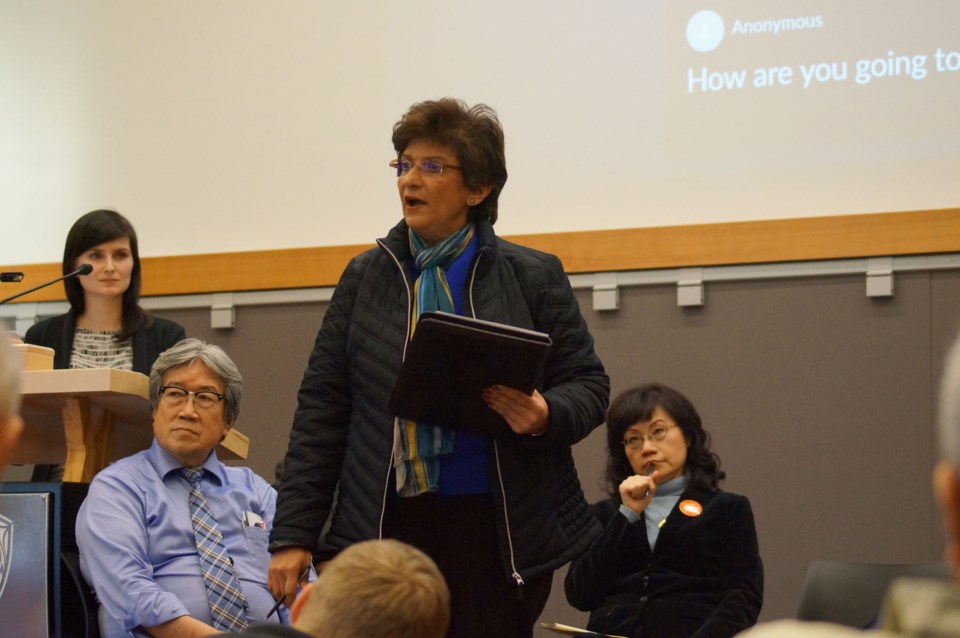Sparks flew at a public debate between several Richmond provincial election candidates at Kwantlen Polytechnic University Thursday evening when Kay Hale of the B.C. Conservative Party took the government to task for building a controversial bridge for, in part, seismic safety concerns, while leaving Richmond’s hospital and schools to fall into disrepair.
“Are we waiting for someone to die? It’s a hospital for God’s sake. Schools; they need seismic upgrades. You don’t want to build a new tower?” Hale asked BC Liberal candidates John Yap and Jas Johal, sitting behind her on a small auditorium stage.
“Why build a bridge? If you’re so concerned about an earthquake coming and the tunnel is going to cause an accident when liquefaction crumbles the tunnel; well how many cars are going to be in there? Maybe 50, compared to the lives in the hospital and schools, with children.”
Hale was interrupted by a spectator who disapproved of her “attack,” when she was supposed to be speaking to how her party would address Richmond Hospital’s ageing north tower.
“I care about the people in the hospital,” Hale exclaimed, denouncing the George Massey Tunnel Replacement Project.
Johal then took control of the mic and said hospital and healthcare funding is a “process” that takes time.
“The challenge is managing all the other needs of the communities, as well,” said Johal, deflecting criticism that the Liberals have delayed building a new hospital tower (since engineering reports in 2005 and 2011 found it to be seismically unsafe).
“That bridge is really about the economy, and the economy is what pays for the healthcare and education,” noted Johal.
The debate also included Green Party candidates Ryan Marciniw, Roy Sakata, and Michale Wolfe and NDP candidates Lyren Chiu, Aman Singh and Chak Au (who left early).
For the first half of the event, candidates took questions related to students.
On housing, Johal said the government had done its job in balancing the free market and intervention, with a 15 per cent foreign homebuyers’ tax.
Yap was quick to dispel criticism that tuition rates were too high by noting the government has recently slashed interest rates from prime plus 2.5 per cent to only prime (2.7 per cent) — a move welcomed by the B.C. Federation of Students.
Yap said B.C.’s tuition fees are “reasonable;” again striking the chord that social spending must be balanced against economic output.
When asked about young people facing precarious working conditions, Yap said B.C. has the lowest unemployment rate in Canada.
“It’s a great success story,” he said.
However, critics have noted that 21 per cent of those employed in B.C. are working part-time, which is the highest rate among provinces in March 2017. The country-wide average is 19 per cent.
Wolfe called for a $15 minimum wage, a popular talking point for his party.
Chiu said adult basic education needs better funding. She repeated this point several times, often failing to answer other questions directly.
On the matter of social spending, Yap said B.C.’s disability rate of $1,033 must be reviewed.
“If that is your only source of income, it’s clearly difficult to live on it,” said Yap.
Still, the government waives MSP fees for those on disability, added Yap.
Sakata took Yap to task, telling him: “Don’t tell me you’re going to do it in the next eight years; you’ve failed to do it in the last eight years.”
Notably, there’s no planned increase in the Liberal platform, released Monday.
The “Wild West” of campaign fundraising was also tackled by some candidates.
Yap said he will wait for an independent review to judge whether or not to put a cap on donations and a ban on corporate and union contributions. That review will come after the election and is non-binding.
“If they were honest about this, they’d do it before the election,” said Marciniw.



